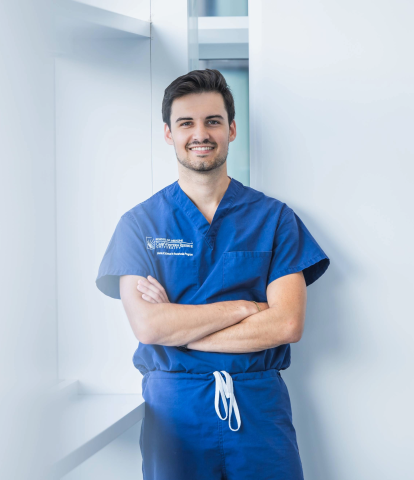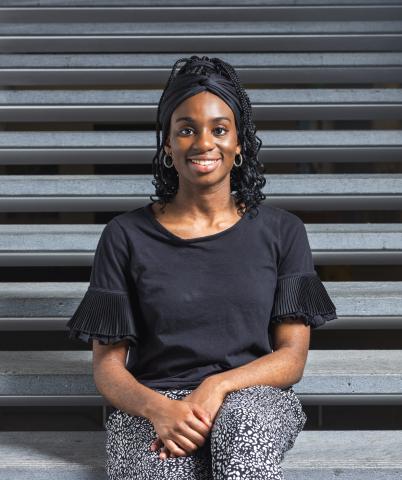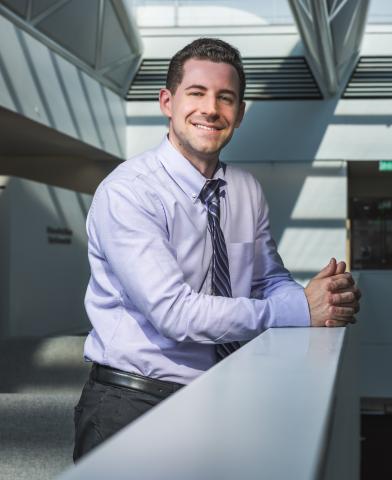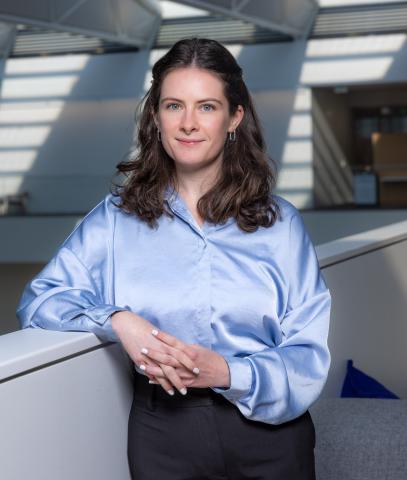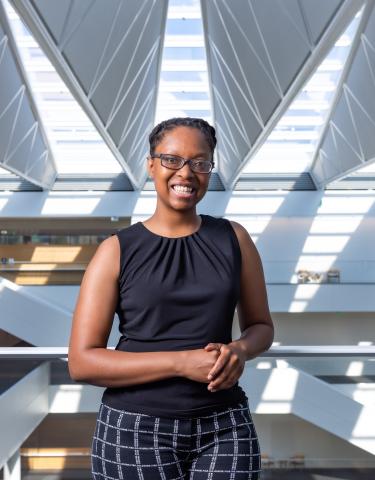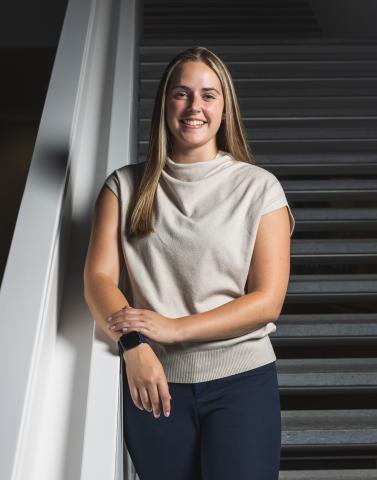At Case Western Reserve University School of Medicine, the future of healthcare is being forged one student at a time. These aspiring medical professionals are not just learners— they are the next generation of leaders, innovators and healers, carrying with them a passion for medicine that will shape the future of patient care and medical science. Whether drawn to research, patient advocacy, global health or clinical practice, these students are united by a shared commitment to making a difference in the world. Meet six students across our broad range of program options.
Christian von Harten
Second-year student, Master of Science in Anesthesia Program
A former Eagle Scout, Christian von Harten was already interested in medicine when he enlisted in the Army Reserve. But he became even more focused after participating in mass-casualty drills as part of a medic unit. He knew he wanted a career that involved service, while also tapping into his love of science.
When he had the chance to shadow a certified anesthesiologist assistant (CAA), he knew that’s what he wanted to do. “My favorite thing about it was that you’re in charge of the patient while they’re asleep,” he said. “You’re watching over their life.”
Von Harten was drawn to Case Western Reserve because it has one of the oldest and most prestigious anesthesiology programs in the country. He’s been impressed by the intensity of his classes, starting with an “anesthesia boot camp” that brings new students up to speed. “It’s like there’s a waterfall of information coming down at you,” he said.
Now on rotations, he said getting the chance to work and learn about different specialities has been exciting and inspiring—and that his U.S. Army training helped prepare him for what was to come.
“They teach you how to communicate and how to work in a team,” he said, “which is exactly what a CAA does in the anesthesia care team model.”
Chineme Onwubueke
Fifth-year student, Cleveland Clinic Lerner College of Medicine Program and Master of Public Health Program
Chineme “Chichi” Onwubueke remembers studying world maps at a young age and noticing that many African countries, such as her family’s native Nigeria, had indicators for poverty, disease and access to clean water.
“Even as a kid, I knew this [disparity] was wrong,” she said.
Now pursuing two degrees at Case Western Reserve—an MD with special qualifications in biomedical research in the Cleveland Clinic Lerner College of Medicine program and a Master of Public Health—Onwubueke hopes to make a difference with a career focused on global health.
She chose the five-year Lerner College program because of its focus on biomedical research, including a research year in which she focused on studying the immune response to the yellow fever vaccine in pregnant women.
During her time at Case Western Reserve, Onwubueke helped organize a global health conference on human trafficking and co-leads MamaStrong, a program supporting mothers in the local community at New City Cleveland, a grassroots nonprofit.
She plans to apply for a residency in pediatrics this fall, preferably in a program that trains her for work in global health or resource-poor communities, she said.
Her goal for her career involves not just treating patients, but addressing some of the social and economic issues that contribute to health.
“In medicine, you’re dealing with the intersection of hope and despair, life and death,” she said. “I see a place for myself in that sphere.”
Grant Volpe (GRS ’24, Medical Physiology)
First-year student, MD, University Program
Grant Volpe always thought he would go to medical school after college. So when he didn’t get in on his first try, he had to quickly come up with a new plan.
After working in a research lab at a large children’s hospital, where he discovered an interest in gastrointestinal pathophysiology, he decided to pursue a master’s degree in medical physiology at Case Western Reserve University.
“I knew I still wanted to go to medical school, but I had a deep yearning to learn more about physiology in general,” he said. “I thought it would not only be a good opportunity to go deep into my area of interest, but that it would also make me a better physician down the road.”
Volpe said a highlight of the program was working with his advisor, assistant professor of physiology and biophysics Jessica Taylor, PhD, who offered support not only with the academics of the program, but also with his future goals.
“The support and guidance I received from her was invaluable, and the opportunity to develop such a relation- ship with an advisor is quite unique compared to other pre-med focused master’s programs,” he said.
Volpe graduated in May and is now in his first year at CWRU School of Medicine. “My goals are to advocate for aspiring first-generation medical students, to combat health disparities that affect immigrant populations, and to explore the field of anesthesia and critical care,” he said, “so that I may be there for patients during their most vulnerable times.”
Landry Cowles
Third-year student, MD, University Program
Growing up in rural Ohio in a family with low income, Landry Cowles never imagined she’d have a career in medicine. Not only did she not know anyone who worked in healthcare, but her family rarely went to the doctor.
Then, as an undergraduate, she volunteered at a sexual assault crisis center. The role involved supporting victims being treated at a local hospital, where she worked alongside emergency responders. It was the first time she considered a career in medicine.
“These people were really vulnerable, and I was in a position to help them,” she said. “It felt powerful to know I was able to give them support that they might not have had if I wasn’t there.”
Later, she returned to do an internship in the emergency room.
Now in her third year of Case Western Reserve’s MD University Program, Cowles is inspired by service and giving back.
“I’m very interested in patient health literacy, and empowering patients to become advocates in their healthcare decisions,” she explained.
A first-generation college student, Cowles received the Ralph T. and Esther L. Warburton Foundation Scholarship to attend Case Western Reserve. The scholarship program—recently expanded by the War-burton family—aims to create a pipeline of healthcare providers to Northeast Ohio hospitals.
For students who are the first in their family to go to college or attend medical school, imposter syndrome can be a real challenge, she said. Cowles has overcome it by building her own support network, reaching out to faculty mentors and peers and joining a first-generation in medicine club.
Her advice to others forging their own path in medicine? “Trust yourself and have faith in yourself,” she said. “You’ve done a lot to get where you are, and it’s where you’re supposed to be.”
A Commitment to the Field of Healthcare
In 2015, The Ralph T. and Esther L. Warburton Foundation made a significant investment to help grow the number of healthcare professionals in Northeast Ohio with the establishment of the Warburton Scholarship Program. With separate endowed scholarships for three schools at Case Western Reserve University—the School of Medicine, School of Dental Medicine and Frances Payne Bolton School of Nursing—the scholarships are awarded to students from families in Stark and Summit counties who have middle-level in- comes, but don’t qualify for need-based aid and lack the resources to cover tuition.
With $6 million already committed by 2019, Sally Bonacker Warburton and her husband, Phillip, felt they needed to do more. That’s why, in August, they made an additional contribution of $2.3 million, bringing the overall support for the program to $8.3 million.
Thanks to the Warburton Scholars Program, 55 students in all—like Landry Cowles—are well on their way becoming a part of the growing community of Northeast Ohio healthcare professionals.
Syrena Bracey
Eighth-year student, Medical Scientist Training Program
Syrena Bracey announced her plans to become a doctor in preschool. But it was a seventh grade summer program geared toward increasing Black and brown students in STEM that introduced her to research.
“I was an inquisitive kid,” she re-called. “Being able to ask a question and figure out how to answer it was super exciting.”
Now in her eighth year of the approximately 10-year Medical Scientist Training Program at Case Western Reserve, Bracey is completing her PhD project on innate immunity and a key protein involved in causing infected cells to self-destruct. Stu- dents in the program, a combined MD/PhD that trains future physician researchers, typically do two years of medical school classroom instruction, spend three to five years on their PhD research project, then complete the clinical portion of their medical degree with hospital rotations.
Bracey says a highlight of her clinical experience so far is seeing Black patients respond to her as a “familiar face,” and tell her they’re proud of her for becoming a doctor. “Representation definitely matters,” she said.
As she dives into rotations this fall, she wants to encourage other students who are from underrepresented groups to pursue their dreams of a medical career.
“If you’re feeling like you can’t do it, look at who’s already here,” she said. “We did it, and so can you.”
Annalise Presutti
Second-year student, Physician Assistant Program
For Annalise Presutti, training for a career in healthcare isn’t just about studying different diseases and treatments; it’s also about learning how patients live with them— and how healthcare professionals can help. Inspired by a classmate’s experience with a chronic condition, Presutti and a fellow Physician Assistant Program student partnered to start Patient Perspectives, which brings patient voices into the classroom.
Patient Perspectives received a grant from the School of Medicine Office of Diversity, Equity, and Inclusive Excellence to help plan events and expand to other graduate and undergraduate programs on campus. Recent panels have included patients with cystic fibrosis, Crohn’s disease and sickle cell disease, with topics selected based on surveys of physician assistant students.
Presutti, who is from Canton, Ohio, has also served as a clinical coordinator of the CWRU Student Run Health Clinic, where students from the medical, nursing, dental and social work schools provide affordable care to area residents.
She said Case Western Reserve’s focus on community involvement along with its reputation for academic excellence and a supportive learning environment were why she chose the program.
“The opportunities for service have not only helped me learn more about the community I’m living in and will one day be treating as a provider,” she said, “they have also enriched my education and helped me grow as an individual.”


